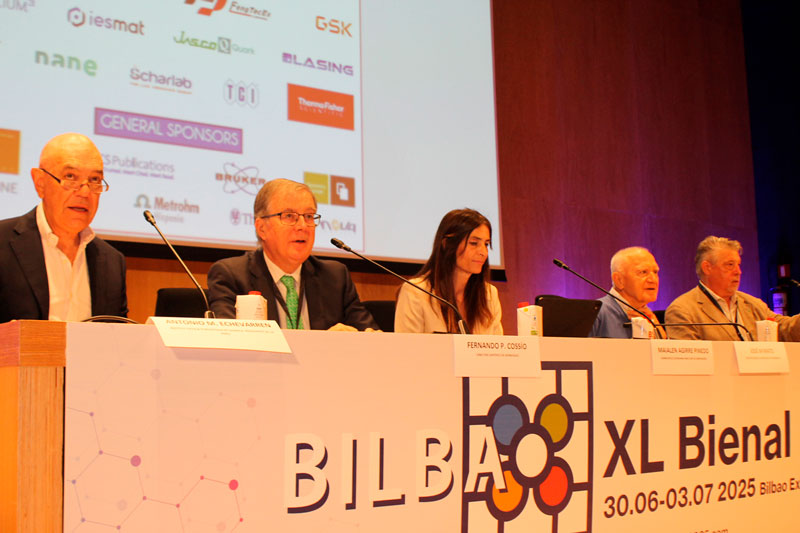
2025/06/30
The 40th Biennial Meeting of the Royal Spanish Society of Chemistry brings together over 1,200 professionals and researchers from 21 countries starting today in Bilbao
The Bilbao Exhibition Centre (BEC) is hosting this discussion forum until July 3rd, presenting advances across all areas of Chemistry on an international scale.
Jesús Jiménez-Barbero, Scientific Director of CIC bioGUNE and Chair of the event's organizing committee, highlighted at the opening ceremony that “over the next four days, cutting-edge research in all fields of chemistry will be presented, from synthetic and theoretical approaches to advances in materials science, catalysis, and the increasingly dynamic interface between chemistry and biomedicine.”
The 40th Biennial Meeting of the Royal Spanish Society of Chemistry (RSEQ) brings together more than 1,200 professionals from 21 countries at the BEC from today until Thursday, July 3rd. Participants will delve into research carried out by the scientific community, both nationally and internationally, across all areas of Chemistry. As a central science, this discussion forum will showcase research at the frontier between chemistry and other disciplines, from mathematics, physics, and materials science to the life sciences.
This meeting is the most important event organized by the RSEQ, whose mission is to promote, develop, and disseminate the field of chemistry—both as a pure science and in its applications—throughout Spain
The organizing committee is chaired by Jesús Jiménez-Barbero, Scientific Director of CIC bioGUNE, and includes prominent researchers from CIC bioGUNE, Ikerbasque, the University of the Basque Country (EHU), CIC biomaGUNE, Atlas Molecular Pharma, and FAES Farma.
In his opening remarks, Jiménez-Barbero emphasized that the high level of participation in the conference is “a clear reflection of the vitality and global relevance of chemistry in addressing current scientific and societal challenges, even in these uncertain times.”
The Biennial Meeting will feature presentations and talks by both national and international speakers, including leading researchers and experts in various branches of chemistry, such as synthetic chemistry, organometallic chemistry for sustainable solutions, new materials development, chemical biology, and the role of carbohydrates in molecular recognition. Sessions will also address topics in chemical education and heritage conservation.
“In the coming days, we will witness cutting-edge research in all fields of chemistry—from synthetic and theoretical approaches to breakthroughs in materials science, catalysis, and the increasingly dynamic intersection of chemistry and biomedicine. Today, we are better equipped than ever to visualize and manipulate molecular systems with unprecedented precision, opening new frontiers in drug design, molecular engineering, and nanomaterials,” explained Jiménez-Barbero at the opening of the Meeting.
Some of the most notable speakers include Bert Meijer (Eindhoven University of Technology), renowned for his research on functional materials and supramolecular chemistry; José Luis Mascareñas (CIQUS–University of Santiago de Compostela), an expert in metal-catalyzed processes within living cells; Helma Wennemers (ETH Zurich), a leading researcher in the molecular design of supramolecular systems; Pedro J. Pérez (University of Huelva), specialized in developing catalytic systems for the valorization of raw materials; Laura L. Kiessling (Massachusetts Institute of Technology), known for her work in chemical biology; Agustí Lledós (Autonomous University of Barcelona), focused on computational chemistry; Rubén Martín (ICIQ–Institute of Chemical Research of Catalonia), recognized for his contributions to organometallic catalysis; and Joseph Wang (University of California San Diego), a pioneer in the development of biosensors.
About the Royal Spanish Chemical Society (RSEQ)
The Royal Spanish Chemical Society (RSEQ) is a professional association that promotes the advancement of chemistry in Spain. Founded in 1903, society represents chemists from academia, industry, and government. Its mission is to promote the exchange of knowledge and ideas in chemistry and to promote the application of chemistry for the benefit of society.
About CIC bioGUNE
The Centre for Cooperative Research in Biosciences (CIC bioGUNE), member of the Basque Research & Technology Alliance (BRTA), located in the Bizkaia Technology Park, is a biomedical research organization conducting cutting-edge research at the interface between structural, chemical, molecular and cell biology, with a particular focus on generating knowledge on the molecular bases of disease, for use in the development of new diagnostic methods and advanced therapies.
About BRTA
BRTA is an alliance of 4 collaborative research centres (CIC bioGUNE, CIC nanoGUNE, CIC biomaGUNE y CIC energiGUNE) and 13 technology centres (Azterlan, Azti, Ceit, Cidetec, Gaiker, Ideko, Ikerlan, Leartiker, Lortek, Neiker, Tecnalia, Tekniker y Vicomtech) with the main objective of developing advanced technological solutions for the Basque corporate fabric.
With the support of the Basque Government, the SPRI Group and the Provincial Councils of the three territories, the alliance seeks to promote collaboration between the research centres, strengthen the conditions to generate and transfer knowledge to companies, contributing to their competitiveness and outspreading the Basque scientific-technological capacity abroad.
BRTA has a workforce of over 4,000 professionals, executes 22% of the Basque Country's R&D investment, registers an annual turnover of more than 300 million euros and generates 100 European and international patents per year.
See a large version of the first picture





